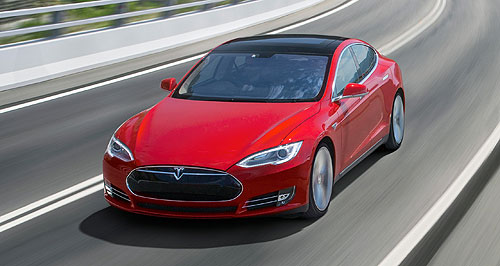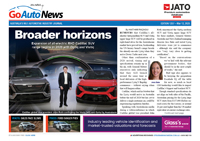Make / Model Search
News - Tesla - Model STesla Aus drivers clock nine million kmsRunning on fair: Tesla’s growing Australian electric fleet has already saved 700,000 litres of fuel and the technology company wants EVs to be acknowledged for their contribution to the environment. Fuel saving figures come as Tesla continues bid for government support6 Jul 2016 TESLA claims its Australian electric vehicle (EV) buyers have now travelled more than nine million kilometres saving about 700,000 litres of fuel, with the figures announced as the brand expands its charging network and renews calls for EV incentives. The US-based company compared petrol saved with that of a vehicle using 7.9 litres per 100 kilometres, identical to the combined cycle fuel consumption of a 3.0-litre twin-turbo V6 Mercedes-Benz S400L. However Tesla declined to commit to a CO2 reduction figure as it is unclear whether the kilometres travelled were following a battery recharge via electricity from renewable sources rather than coal power. Local Teslas would have saved 165 tonnes of CO2 using ‘green’ energy only. Along with the news of how much fossil fuel the growing fleet had saved, Tesla also announced it will complete the rollout of its supercharger connections along major east coast cities by the end of the year. The company will expand the emissions-free high-power recharge outlets, which are free for Tesla owners to use, into northern New South Wales and Queensland and beyond the existing eight outlets positioned along the Hume Highway and Pacific Highway between Melbourne and Port Macquarie, New South Wales. Tesla will also install an additional 75 ‘destination chargers’ in 2016, bringing the number of lower-powered hotel, kerbside or shopping centre charge points to 175 nationwide. Tesla senior manager of marketing and communications Heath Walker used the announcement at the brand’s Sydney flagship store launch, to reiterate that barriers to EV ownership in Australia no longer lie with recharging infrastructure but rather government legislation. “We have very clear requests into government in addition to how we think EV will develop within the country, and I think the removal of Luxury Car Tax (LCT) on electric vehicles should be the highest element on the list,” Mr Walker told GoAuto at the event. “Not just because we sell EVs, but because it’s the right thing to do and holistically, if you look at first world countries, we’re the only first world country to put a tax on electric vehicles at the moment.” New vehicles that consume fewer than 7.0 litres per 100 kilometres currently attract a 33 per cent LCT on transactions $75,375 or higher. Thirstier cars are taxed from a lower amount. On an entry Tesla Model S 60 buyers pay $7628 in LCT, while a flagship Model S P90D collects $27,127 in additional tax. “Although there is a margin for where we get a retraction on that luxury car tax … we’re one of only five first world countries that don’t provide an incentive as well,” Mr Walker added. “Our future owners are getting a double bang in terms of payment.” Mr Walker confirmed that Tesla contributed to the federal government’s forum on new vehicle emissions initiated by former federal minister for major projects, territories and local government Paul Fletcher, and former federal environment minister Greg Hunt prior to the 2016 Australian federal election. Stakeholder engagement sessions have been held with vehicle manufacturers to discuss ways to reduce national vehicle emissions that stood at a new vehicle fleet CO2 average of 184g/km in 2015, leaving Australia ranked equal-31st in the world for emissions alongside Mexico. Tesla has co-signed, along with Mitsubishi and energy suppler AGL, a submission produced by non-profit organisation ClimateWorks Australia, in partnership with Monash University. As ways to lower national emissions, the submission nominates “annual” incentives for low emissions vehicles such as tax rebates, registration and stamp duty reductions, parking fee deductions and taxes based on the amount of CO2 vehicles emit. It even calls for higher fuel prices in addition to “punctual” incentives such as free or reduced parking fees and road tolls. “It (LCT) was introduced to protect local manufacturing and that’s no longer being supported, and if it’s about treasury and the income then it’s an opportunity to have a look at an emissions tax,” Mr Walker continued. Mr Walker suggested that while luxury vehicles could be taxed on fuel consumption, luxury EV owners could be taxed if they do not recharge using green energy. The measure would aim to ensure the process of recharging was not transferring CO2 emissions from vehicle tailpipe to power station. “At the end of the year you get a rebate based on whether you’ve used green energy to charge the car,” Mr Walker suggested. “We’re not about protecting our owners, but if they’re doing the right thing they shouldn’t be punished. “Australia is a long way behind other countries in this field (CO2 emissions) and it’s not just Tesla saying that, it’s the industry saying that, and that’s why they (federal government) have asked for submissions.” Mr Walker also confirmed that the federal government had become more responsive to calls to reduce national vehicle emissions since Malcolm Turnbull became prime minister late last year. “I think Malcolm Turnbull certainly has an understanding of electric vehicles, he’s visited Tesla last January and had a glowing report, he’s had the environment portfolio, he’s had the technology portfolio, so he understands tech and environment which marries well for Tesla,” he said. “We met with him at a Qantas innovation day just last week and he said that he’d driven the car (Tesla Model S) and was very impressed with the car, so he has an understanding and appreciation of what Tesla does on the energy side as well.”  Read more |
Click to shareTesla articlesResearch Tesla Model S pricing
Motor industry news |












Facebook Twitter Instagram